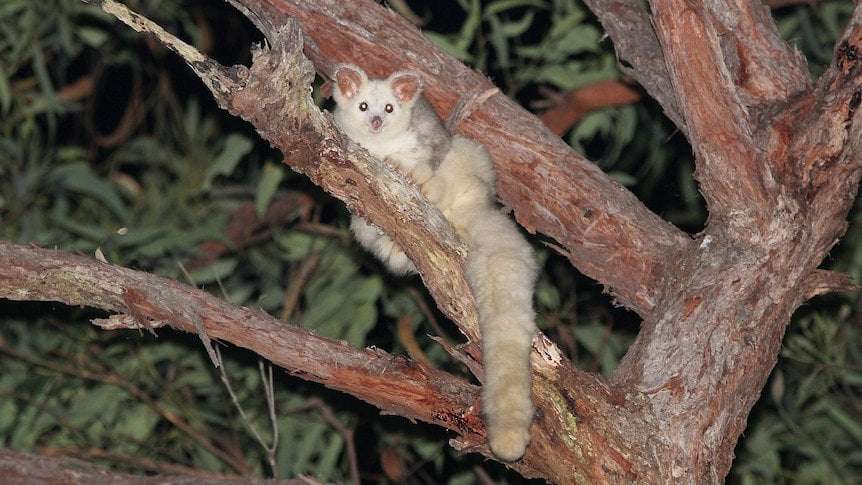A new study has offered a glimpse of hope for researchers battling to conserve the endangered southern greater glider.
Key points: Endangered southern greater gliders are quickly adapting to hi-tech nest boxes
Endangered southern greater gliders are quickly adapting to hi-tech nest boxes Almost one-third of their habitat was destroyed in the 2019/20 Black Summer bushfires
Almost one-third of their habitat was destroyed in the 2019/20 Black Summer bushfires Climate change poses a significant threat to the remaining population of greater gliders
Almost one-third of the gliders’ remaining habitat was burnt in the Black Summer bushfires, with the loss of many of the hollow-bearing trees that they used to breed.
The tree hollows, which provide a safe environment for the gliders to raise their young, can take up to 80 years to form.
In the wake of the bushfires The Australian National University, Greening Australia, and the World Wide Fund for Nature-Australia teamed up to place more than 200 high-tech thermally appropriate nesting boxes at Glenboc, in Victoria's East Gippsland, and inside the Tallaganda National Park near Braidwood in NSW.
The boxes utilise insulation, air gaps, and heat-reflective, fire-resistant non-toxic coatings, in order to keep the animals and at the optimal temperature, and best imitate the hollow of a tree.
A study using motion-triggered cameras has revealed the animals were quickly moving into the nest boxes, which were installed last year.
There are hopes new research will help the remaining population of endangered southern gliders. ( Supplied: Dr Peter Smith )
Research Fellow at the ANU Fenner School of Environment and Society Kara Youngentob said the species was the largest gliding marsupial at risk of extinction, and the recent findings were a positive step forward in understanding how many were left in the wild.
"What we didn't know was whether these boxes worked and whether they have an impact on the glider population," Dr Youngentob said.
"Much to our delight, within a few months of them going up they are already being used by gliders, so we know the individuals themselves like them and use them."
An aerial view of a nest box being installed in Bendoc in Victoria's East Gippsland. ( WWF Australia: Andrew Kaineder )
World Wide Fund for Nature Australia's threatened species and climate adaptation ecologist Dr Kita Ashman said she spotted a glider in the second nest box she checked.
"I just burst into tears, I was so surprised and so happy," Dr Ashman said.
Dr Youngentob said while there was very little data on many greater glider populations, their habitat had been reduced by as much as 80 to 100 per cent in areas that have been monitored over the last three decades.
The impacts of climate change, with night temperatures rising at a faster rate than daytime temperatures, were also presenting a significant threat to the nocturnal animal.
"We are at the point where we could lose them if we don't do something about it," Dr Youngentob said.
"We need to think about what's important to us and what we want, and I think most Australians would want to keep this iconic creature that lives nowhere else in the world."
One hundred and fourteen nest boxes were placed near Bendoc in Victoria's East Gippsland. ( WWF Australia: Dr Kita Ashman )

Amationary on January 13rd, 2023 at 18:35 UTC »
“Burst into tears” is a common phrase/hyperbole here in Aus, just in case it’s not common elsewhere. Just means cried, could have been a few tears while cheering or full out sobbing, it’s a wide spectrum.
So happy about the nest boxes working!!! Love our wildlife and the fires have been devastating
LightbulbIcon on January 13rd, 2023 at 13:18 UTC »
It’s heartwarming to hear about the passion people have for such an important thing. Amazing work
SaladeVerte on January 13rd, 2023 at 10:26 UTC »
Tell me you want a shocking headline without telling me you want a shocking headline